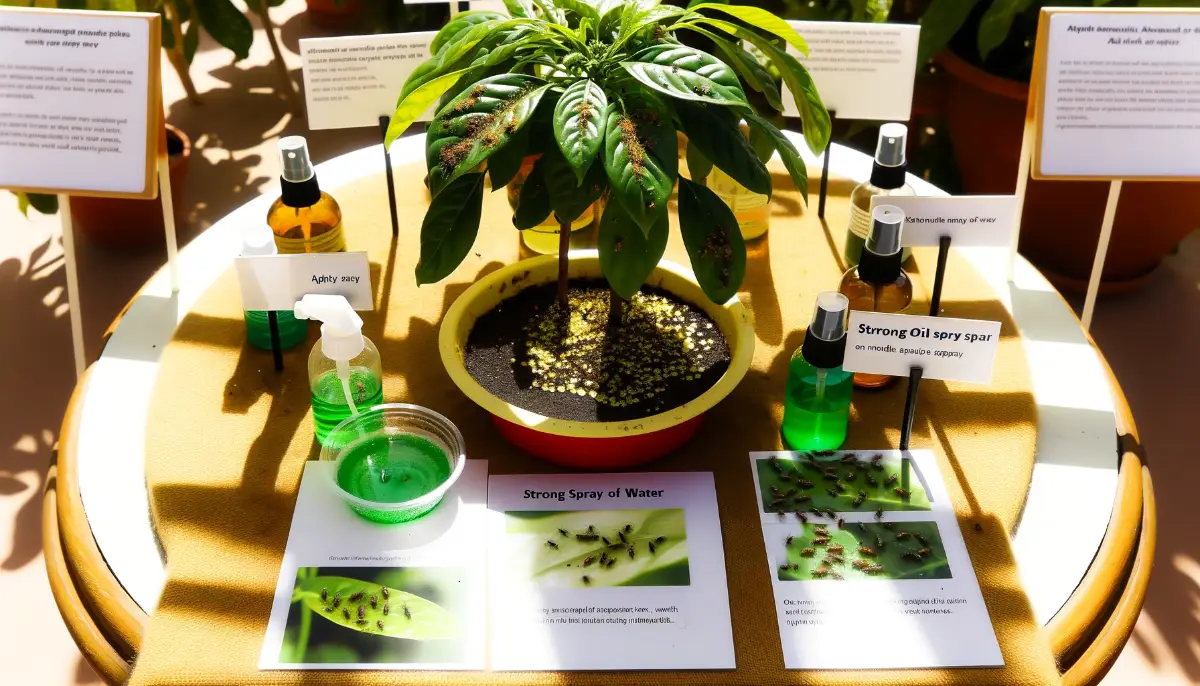Finding ants crawling around your house plants can be more than just a nuisance; it’s a sign that your green friends are under siege. Before reaching for harsh chemical pesticides, consider the health of your plants, pets, and family.
This article explores effective, organic methods to rid your house plants of ants, ensuring they thrive in a pest-free environment.
Understanding Ants in House Plants
Why Ants Are Drawn to Your Green Haven
Ants in house plants are a symptom, often misunderstood. They are attracted to the moist and nutrient-rich environment that houseplants provide. However, their presence could also signal other pests, like aphids, that feast on your plant’s sap and excrete honeydew, a sweet, sticky substance that ants devour.
The Potential Harm
While ants themselves don’t pose a direct threat to plants, their activities can stress plants and lead to poor growth and vitality. They can also farm aphid colonies, exacerbating the problem.
Organic Methods to get rid of ants
- Diatomaceous Earth: Nature’s Pest Control : A fine powder made from the fossilized remains of algae, diatomaceous earth acts like microscopic razor blades to ants but is harmless to humans and pets. A gentle sprinkle on the soil’s surface forms an impassable barrier for ants.
- Cinnamon’s Spicy Barrier : Cinnamon, in powder or oil form, emits a scent that’s unbearable to ants. Circumnavigate your plant with a line of cinnamon or spray a diluted solution of cinnamon oil and water to create a scent barrier.
- The Essential Oil Fortress : Peppermint, citronella, and lemongrass oils, known for their potent scents, serve as excellent ant deterrents. Mix a few drops with water in a spray bottle and mist the affected areas for a fragrant defense.
- Coffee Grounds : Ants tend to avoid coffee grounds. The nitrogen in coffee grounds burns ants upon contact, and its strong odor disrupts their scent trails. Scatter coffee grounds around your plants or the foundation of your home to create a barrier.
- Cornmeal : Offering cornmeal to ants acts as a deceptive food source. Ants can’t digest cornmeal, and once they eat it, it expands inside their stomachs and kills them. This method takes time, as the ants need to carry the cornmeal back to their colony.
- Chalk : Drawing lines with chalk around entry points or garden areas creates a barrier ants avoid. The calcium carbonate in chalk is thought to interfere with their ability to follow scent trails.
- Vinegar and Water Spray: A solution of equal parts vinegar and water can erase scent trails and deter ants with its strong smell. Spray this solution directly on ants and along their paths to disrupt their navigation.
- Cucumber or Citrus Peels: Placing cucumber or citrus peels in areas of ant activity can deter them. Ants find the taste of these peels bitter and toxic, especially the citrus oils, which act as a natural repellent.
- Soap and Water: A spray made from diluted dish soap and water can suffocate ants by breaking down their exoskeleton and dehydrating them. This method provides an immediate but temporary solution.
Indoor Plants That Naturally Ward Off Ants
There are several indoor plants known for their ability to repel ants, making them not only decorative but also functional for keeping your home pest-free. Here are some of the most effective plants:
Peppermint and Spearmint: These mint varieties emit a strong scent that repels ants and other pests. They’re easy to grow indoors, but it’s advisable to keep them in containers to prevent them from spreading too aggressively.
Basil: Known for its strong aroma, basil can help keep ants away when placed in sunny spots around your home, especially near entry points or in the kitchen.
Garlic: While not the most common houseplant, garlic can deter ants due to its strong smell. It can be easily grown in pots and requires plenty of sunlight.
Sage: This herb can be used both for cooking and as an ant repellent. Its oil and fragrance are unappealing to ants, making it effective when placed around the home.
Catnip: Although it attracts cats, catnip repels ants due to its nepetalactone content. It can be grown in pots or directly in your garden to keep ants at bay.
Chrysanthemum: Some varieties of chrysanthemums produce pyrethrins, a natural insecticide that deters ants and other insects. They need to be grown in areas with plenty of light.
Pennyroyal: Part of the mint family, pennyroyal also repels ants. However, it’s important to be cautious, as it can have harmful effects if not handled properly.
Tansy: Known for its potent smell and insect-repelling qualities, tansy can be effective against ants. It’s also known to be invasive, so it’s best kept contained.
Painted Daisies: These flowers are not only beautiful but also produce pyrethrins, which act as a natural insecticide against ants. They can be used by crushing the flowers and placing them around the home.
Autumn Mums (Chrysanthemum morifolium): Like painted daisies, autumn mums are effective due to their pyrethrin content. They should be placed near entryways or garden beds to deter ants.
Rue: With a potent smell that ants find unappealing, rue is another plant that can help repel ants. It can also protect chicken yards and act as a companion plant for roses.
These plants offer a natural and aromatic way to keep ants at bay. Remember, the key to their effectiveness lies in their placement around the home, especially near entry points and areas where ants are commonly seen.
FAQs on Naturally Repelling Ants from Your Home
What are some effective natural methods to ward off ants from my home?
Ants can be deterred using a variety of natural methods including the use of peppermint oil, cinnamon, vinegar solutions, and diatomaceous earth. These substances interfere with the ants’ scent trails or create an inhospitable environment for them.
Can indoor plants really help repel ants?
Yes, certain indoor plants like peppermint, spearmint, basil, and sage have natural properties that repel ants due to their strong scents or the substances they produce.
How does peppermint oil repel ants?
Peppermint oil contains a strong scent that is overwhelming to ants and masks their scent trails, making it difficult for them to navigate and find food sources.
Can vinegar be used to deter ants, and how?
Vinegar, when mixed with water, can erase the pheromone trails left by ants, effectively disorienting them and preventing them from returning. A 1:1 solution of water and vinegar can be sprayed directly on ant trails and entry points.
What is diatomaceous earth, and how does it work against ants?
Diatomaceous earth is a powdery substance made from fossilized algae. It acts as a desiccant, absorbing the oils and fats from the exoskeleton of ants, leading to dehydration and death.
Why are garlic plants effective in repelling ants?
Garlic emits a strong odor and contains sulfur compounds that are unappealing to ants, making it an effective natural repellent when grown indoors.
How can I use cinnamon to keep ants away?
Sprinkling cinnamon powder around entry points, ant trails, or directly into the soil of potted plants can deter ants due to its strong scent, which disrupts their scent trails.
Are there any risks associated with using natural ant repellents around pets and children?
Most natural ant repellents like peppermint oil, vinegar, and cinnamon are safe around pets and children. However, it’s important to use them in moderation and ensure pets or young children do not ingest plants like pennyroyal, which can have harmful effects.
How can I prevent ants from coming into my home in the first place?
Preventing ants involves sealing cracks and crevices, keeping your kitchen clean, removing standing water, managing waste properly, and using natural deterrents around potential entry points.
What should I do if natural methods don’t fully eliminate my ant problem?
If natural remedies are ineffective, it may be time to consult a professional pest control service that offers environmentally friendly solutions. They can provide targeted treatments without resorting to harsh chemicals.









